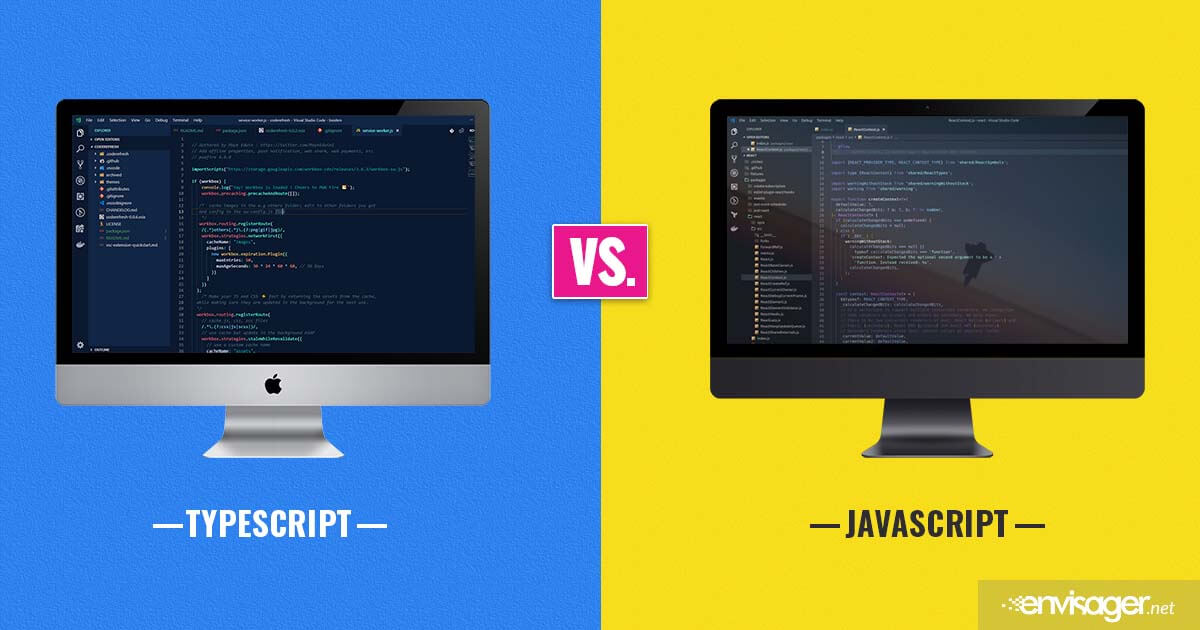TypeScript vs JavaScript: Differences and Similarities

JavaScript has received high praise because of its powerful features to enhance website interaction. It’s also the most used scripting language for many web development projects and has been in existence for over 20 years.
TypeScript can be described as a type of JavaScript with a set of additional features. In this JavaScript vs TypeScript article, we compare the differences and similarities of these two languages.
- What is JavaScript?
- What is TypeScript?
- Why JavaScript?
- Why TypeScript?
- Difference between JavaScript and TypeScript
- History of JavaScript
- History of TypeScript
- Features of JavaScript
- Features of TypeScript
- JavaScript vs TypeScript: Which is better?
Ok, let’s dig in.
1. What is JavaScript?
JavaScript is a popular programming language which helps you create dynamic web pages. It’s mostly used on the client-side and it runs in the web browser without the need of any resources from the web server.
The scripts are embedded within web pages and automatically executed when the page loads. Because the script is provided in simple text, it does not need any special compilations. And this feature makes JavaScript relatively fast. However, JavaScript was designed for applications containing a few 100 lines of code. It is not designed for large, complex applications.
Although JavaScript is well-known as a scripting language for web pages, it’s also used in many non-browser environments. This includes use in Adobe Acrobat, Node.js and Apache CouchDB.
2. What is TypeScript?
As stated early on in this article, TypeScript is a superset of JavaScript. What we didn’t say is that TypeScript provides features such as classes, generics, interfaces , and static typing. By catching mistakes early through its type system, TypeScript makes JavaScript development more efficient. When IDEs are enabled, it provides a more thoughtfully designed area for spotting common errors as you type the code.
To put it differently, TypeScript is a modern age JavaScript programming language.
Key Differences
- JavaScript is a scripting language which helps you create dynamic web pages whereas Typescript is a superset of JavaScript.
- TypeScript code needs to be compiled while JavasScript code does not need any special compilations.
- Prototyping: TypeScript supports this feature, but JavaScript does not.
- TypeScript uses concepts like classes and interfaces to describe data being used. JavaScript doesn’t support this concept.
- TypeScript is a robust type system, including generics and static typing needed for large size project. JavaScript is more suitable for small size project.
3. Why JavaScript?
- Its use has now extended to mobile app development, desktop app development, and game development.
- Can be used in both front-end and back-end of web development.
- Ideal for small size project.
- Compiled JavaScript runs in any browser.
- Open source project with Microsoft funding.
- Supports modules, classes and interfaces.
- JavaScript can be extended for writing large apps.
4. Why TypeScript?
- It is a superset of JavaScript.
- TypeScript implies JavaScript making it easier to code, read and debug.
- It’s a powerful type system including generics.
- Most of the commonly used libraries are supported with Type Definitions.
- Easier refactoring.
- TypeScript code can be converted into plain JavaScript code.
- It allows developers to focus on exposed API rather than having to know all the code by heart.
5. Difference Between JavaScript and TypeScript
Following is the main difference between JavaScript and TypeScript:

| JavaScript | TypeScript |
| A scripting language for developing dynamic web pages | A JavaScript superset for tackling large code projects through collaboration |
| In interpreted languages, therefore, it is possible to find errors during run time | Errors can be discovered and corrected during compilations |
| No option for static typing; weakly typed | Supports both static and dynamic typing, strongly typed |
| Used directly in browsers | Converted into JavaScript before use in browsers |
| JS libraries work by default | All JS libraries and code works without any changes since its a superset |
| Does not support compilation of any of the ES features | TS supports all ES features |
| It does not support modules, generics, and interfaces | Supports module, generics, and interface for data definition |
| The feature for functions to have optional parameters is not available | Functions can have optional parameters |
| Example code:function sum (x, y) { return x+y;}var result = sum(20, 35);console.log(`adding x and y we get ` + result); | Example code: |
| Numbers and strings are classified as objects | Numbers and strings are considered to be interfaces |
| It does not support creating prototypes | Supports forming prototypes |
| No primary scripting language is needed and can be learned right on the go! | Scripting knowledge is a prerequisite and takes time to learn how to code |
6. History of Javascript
JavaScript was originally called Moncha. It was developed by programmer Brendan Eich of Netscape Communications Corporation and launched on September 1995. In 1996, Netscape present JavaScript to the European Computer Manufacturers Association (ECMA) as the best scripting tool.
7. History of Typescript
Microsoft developed Typescript and also maintained it under the Apache 2 license. It was developed by a programmer Andres Hejlsberg and introduced for use in October 2012. In 2013, a new version of Typescript was developed by Microsoft- TypeScript 0.9. The latest stable version is TypeScript 3.4.5, which was released in April 2019.
8. Features of JavaScript
- Low reloading speed
- Great for communication with a server
- It’s easy for beginner programmers to learn
- Used for client-side and server-side
- Excellent cross-platform language
- You can do just about whatever you want with any object
9. Features of TypeScript
- Scalable HTML5 client-side development
- Code navigation and bug prevention
- Supports classes, subclasses, interfaces, and sub-interfaces
- Offers great productivity for developers
- Maintainability
- Rich IDE available with autocomplete and code navigation feature
10. JavaScript vs TypeScript: Which is better?
While JavaScript has been available since 1995, TypeScript has gained momentum. To conclude this TypeScript vs JavaScript differences article, we can summarize like this. JavaScript is more conducive to small coding projects. And for large projects where team collaboration is needed, TypeScript would be the better solution.
You may also enjoy reading: Website Optimization: Everything a Website Designer Needs To Know

Darrel Carpenter
DIRECTOR OF DEVOPS
Darrel brings to the table 10 years of education, more than 20 years of engineering experience, and 3 decades of tireless tinkering. He is our Systems Administrator, Network Engineer and builds all the infrastructure that powers our client’s websites, emails and more. In his off time, he enjoys writing about writes about servers, content management systems, cloud computing, web hosting, and more.


